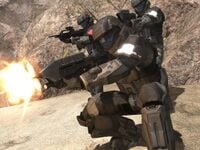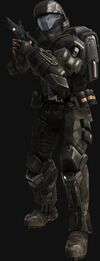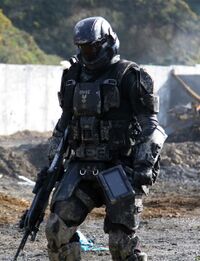ODST armor: Difference between revisions
From Halopedia, the Halo wiki
| Line 24: | Line 24: | ||
===Advantages=== | ===Advantages=== | ||
The Body Suit is lightweight and offers protection in hard vacuum. It supplies more armor protection than standard Marine armor, and incorporates an enhanced communications suit. Along with the protection and communications gear, the Body Suit provides increased agility and maneuverability not afforded by standard [[UNSC Marine Corps|Marine]] Armor. The Body Suit's helmet can withstand several headshots. The armor’s black coloring gives wearers an advantage at night, in space, and during MOUT, as well as providing a psychological effect on hostile forces. The suit also protects against the extreme heat created by the HEV's that ODSTs enter a planet in | The Body Suit is lightweight and offers protection in hard vacuum. It supplies more armor protection than standard Marine armor, and incorporates an enhanced communications suit. Along with the protection and communications gear, the Body Suit provides increased agility and maneuverability not afforded by standard [[UNSC Marine Corps|Marine]] Armor. The Body Suit's helmet can withstand several headshots. The armor’s black coloring gives wearers an advantage at night, in space, and during MOUT, as well as providing a psychological effect on hostile forces. The suit also protects against the extreme heat created by the HEV's that ODSTs enter a planet in. | ||
===Disadvantages=== | ===Disadvantages=== | ||
Revision as of 14:34, June 24, 2009

The Body Suit is the fully-sealed combat armor worn exclusively by the Orbital Drop Shock Troopers (ODST), special-operators of the UNSC Marine Corps.
Description
The helmet of the suit has a dark protective plate with matte black titanium armor surrounding it. The suit itself is black around the torso with a black and gray camouflage pattern around the legs. The boots and gloves are also black. There are often ad hoc additions on the shoulder plates, such as various color flashes or the blood type of the ODST in question. There are also several variations to the ODST armor including Ranged, Close Quarters, and Recon; each designed for different missions. The armor's faceplate can also apparently polarize, as in the demo for Halo 3: ODST eyes can be seen behind the faceplates before they darken, assuming the characteristic look.
History
Not much is known about the history, development, or implementation of the Body Suit. It is known that the young SPARTAN-IIs used the Body Suit before they got their MJOLNIR Armor. The ODST Armor has come in several designs since its first iteration. The current armor is an offshoot of the MJOLNIR Armor, using CTC's and HUD Communications Systems from the MJOLNIR program to give more situational awareness to the wearer. The suit was recently upgraded with added protection, endurance, and agility.
It was then used on Delta Halo, during the events of Halo 2. It proved effective on the most part, absorbing the shock for most of the ODSTs inside the HEVs. Others; however, died on impact upon hitting the Halo's surface, though this was mainly from drowning after crashing in a lake or hitting a vertical surface, like the wall of a canyon. The suits could take a bit more damage than a normal standard issue Marine combat ensemble, and much more than the ODST ballistic armor used on Alpha Halo.
By the events of Halo 3, however, the body suit became much more powerful, suggesting that in between Halo 2 and Halo 3, the technology was enhanced sufficiently, or that the ODSTs have switched their armor to a more reliable suit. The ODSTs using this armor helped The Master Chief, Thel 'Vadam, and the rest of the Separatist-UNSC forces to rout Covenant ground forces on the Ark. With the mentioning of a technological advance one should remember, when having read the book, Ghosts of Onyx that the SPARTAN, Kelly-087 sees the SPI Armour, and remarks on having to remember seeing ODSTs experimenting with a type of Camouflage armor that the SPARTAN-III generation wears.
Systems
The Body Suit has cooling and heating units that masks the infrared signature of the wearer, as well as creating a comfortable environment. The body armor, boots and gloves are fully sealed and gas tight, making them wearable in vacuum for up to fifteen minutes when equipped with an oxygen tank. The helmet has encrypted communications gear and a HUD, along with thermal sensors and motion detectors giving the wearer an advantage over the standard Marines.
Advantages
The Body Suit is lightweight and offers protection in hard vacuum. It supplies more armor protection than standard Marine armor, and incorporates an enhanced communications suit. Along with the protection and communications gear, the Body Suit provides increased agility and maneuverability not afforded by standard Marine Armor. The Body Suit's helmet can withstand several headshots. The armor’s black coloring gives wearers an advantage at night, in space, and during MOUT, as well as providing a psychological effect on hostile forces. The suit also protects against the extreme heat created by the HEV's that ODSTs enter a planet in.
Disadvantages
Unfortunately, the suit's general complexity leads to complications. Over prolonged periods of time the suit will become very uncomfortable to wear, and is difficult to repair in the field. Its effectiveness is decreased in desert or arctic environments where harsh light and sparsity of dark colors makes the suit less of a camouflage and more of a target indicator. Despite being improved over the standard armor, it is still vulnerable to plasma weapons and larger ballistic projectiles; e.g. rounds fired from Needlers and Brute Spikers.
MJOLNIR ODST Helmet
The MJOLNIR ODST helmet in Halo 3 is derived from the technology utilized in MJOLNIR armor. It is attained and unlocked by the Spartan Graduate Achievement, or getting 5 XP in Matchmaking. At one point in development the ODST helmet had an antenna on its back (See "Halo 3: PAX 2007 Omegathon Round 2 Cam Gameplay"; the antenna can be glimpsed for a brief moment when the player dies). The visor on the regular ODST helmets is blue, while the Spartan MJOLNIR ODST helmet has a dark orange visor.
- It is a theory that some MJOLNIR Variants may be used by Special ODST Units. One such theory indicates that the Scout and Recon Variants could be used by ODSTs.
- There are special types of ODSTs for heavy support, scouting, and other special purposes. This can be seen in the Halo 3 ODST concept art.
Trivia
- The ODST helmet is derived from an early concept of a MJOLNIR armor's helmet, but were scrapped because it made the Chief look "too mean". The helmet serves to distinguishes the elite ODSTs from regular UNSC Marines.[verification needed]
- The visor's ability to polarize, the VISR mode, and the HUD it displays means it likely has a transparent Organic Light Emitting Diode(OLED) screen coating it.


